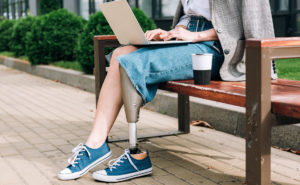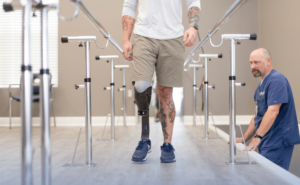Simply looking in the mirror can be difficult for individuals with limb amputation. Coming to terms with the fact that they can never get back what was once there is a major challenge. After surgery, amputees go through a life-changing event that greatly alters their self-image, identity, and overall quality of life. While the physical aspect is the most visible change, the emotional and mental impact of amputation cannot be overlooked. However, not all hope is lost. Coping mechanisms, such as therapy, amputee support groups, and self-care, can help them adjust to their new life after amputation.
This article addresses the relationship between amputation and mental health, including the emotional challenges that can arise after amputation and the common mental health issues that may occur. Whether you are a veteran or a new amputee, we will provide you with much-needed resources to help you on your journey to recovery and healing.

Mental Health Challenges for Amputees
Amputation can have a profound impact on a person's mental health. Roughly 41% of individuals who experience surgical removal of a limb are at risk of succumbing to depression, post-traumatic stress disorder (PTSD), substance use, and anxiety.
A review of studies conducted in India shows that amputees have a depression rate ranging from 10.4% to 63%. PTSD is also common among 3.3% to 56.3% of the amputee population. Lastly, at least 3.4% to 10% of amputees experience anxiety.
It is important to note that the mental health challenges faced by amputees are complex and multifaceted. Symptoms may include, but are not limited to, the following:
- Dissociative symptoms
- Sadness, hopelessness, and restlessness
- Loss of interest in activities
- Fear of the unknown
- Panic attacks
- Insomnia
Amputees' reactions may be influenced by various factors, including the cause of the amputation, the individual's support system, and overall physical and emotional health. Therefore, people who have undergone an amputation must receive comprehensive psychological care to help them overcome these challenges and improve their overall quality of life.
Coping Strategies for Amputees
There are a variety of coping strategies that can help individuals improve their emotional well-being and standard of living. Below are some common methods amputees can use to maintain their mental health:
Therapy
Therapy can be an effective way for amputees to overcome emotional challenges and resolve issues related to their amputations. Cognitive behavioral therapy (CBT) is one approach that is particularly effective for amputees. CBT can help amputees manage anxiety and depression related to limb loss by changing negative thinking patterns and behaviors.
Support Groups
Surrounding yourself with trusted family members and friends is one of the most practical coping strategies. Keeping in good contact with them will give you peace of mind and make you feel less judged. Also, you'll always have someone to talk to about your thoughts and concerns.
Amputee support groups provide a safe and supportive environment to connect with others who have had similar experiences. These groups can help you feel less isolated, provide a sense of community, and offer practical advice for life after amputation.
Self-care
Self-care activities, such as exercise, meditation, and relaxation, can benefit your mental health. Exercise, in particular, can improve mood and reduce symptoms of depression and anxiety. Adequate sleep, a routine, and healthy meals are especially important in the early stages of recovery.
An example of these coping strategies is Horton's peer support group, A.B.L.E. It offers support to amputees with physical and emotional injuries by hosting group meetings and sharing inspirational stories.
Quadruple Amputees and Mental Health
A quadruple amputation is a rare but traumatic event.
This type of amputation involves the loss of all four limbs and can have significant physical and emotional effects. While all amputees face psychological issues, quadruple amputees may face unique challenges that require specialized support.
Physical and Emotional Challenges Faced by Quadruple Amputees
Losing all four limbs can lead to feelings of helplessness, loss of independence, and profound grief. The physical challenges can also be significant, as quadruple amputees may need assistance with daily activities, such as eating, bathing, and dressing. The loss of independence and the need for constant assistance can be major sources of emotional distress.
In addition, quadruple amputees may experience more challenging barriers to mobility, communication, and access to care. For example, communication barriers can be significant when a person loses their arms and ability to speak due to an injury. Furthermore, access to care can be challenging if a person lives in a rural area without specialized prosthetic care.
Resources and Support Available for Quadruple Amputees
In general, the Amputee Coalition of America (ACA) website is a good starting point for finding valuable information and resources for all amputees. Quadruple amputees can also turn to the Enhancing Skills for Life organization. The group provides scholarships, educational opportunities, resources, and peer support for people with bilateral upper or quadruple limb loss.
The Role of Amputee Therapy
Amputee therapy can help amputees regain physical function, learn new skills, and improve their overall quality of life. However, therapy can also have significant emotional benefits, such as reducing anxiety, depression, and PTSD symptoms.
Different Types of Amputee Therapy
Occupational Therapy
Occupational therapists can help amputees learn how to perform daily activities using prosthetic devices or adaptive equipment. This may include learning to cook, dress, groom, etc. Your occupational therapist can also help you decide the necessary modifications to your home, such as ramps or stair lifts.
Physical Therapy
This is another type of therapy that can be beneficial for amputees. Physical therapists can help amputees regain strength, flexibility, and balance after losing their limbs. They can also help amputees learn how to use their prosthetic devices effectively and safely.
Massage Therapy
Massage therapy helps relieve the muscle tension, stiffness, and spasms that amputees may experience during prosthetic training or even when they are already wearing a prosthesis. Reduced pain can have positive psychological effects on amputees and motivate them to perform better during rehabilitation.
Amputees must have access to comprehensive care that addresses their physical and emotional needs to support their recovery and well-being.
These therapies allow amputees to learn new skills and techniques that can help them regain their independence, leading to a renewed sense of self. Good self-esteem can improve mental health and overall quality of life for amputees.
The Amputee Coalition and Amputee Support Groups
The ACA is a philanthropic organization that seeks to support people who have suffered limb amputation. The organization provides various resources and services to help amputees overcome the physical, emotional, and practical challenges of limb loss.
One of ACA's most valuable services is its amputee support groups. These groups can provide a sense of community and understanding to amputees who feel isolated or alone. Support groups can also be a way to share information and advice about prosthetics, mobility, and accessibility.
In addition to support groups, the ACA offers a wealth of resources and information on its website. These include educational materials, research studies, and a directory of healthcare providers and rehabilitation facilities specializing in amputee care.
How to Find Amputee Support Groups Near You
If you want to join an amputee support group, the Amputee Coalition of America is an excellent place to start. Its website provides a directory of support groups across the United States, organized by state and region. You can also contact the ACA directly to learn more about its services and resources.
Some other organizations and resources, including local hospitals, can help you find amputee support groups near you.
Before joining a support group, be sure to ask yourself the following questions:
- What type of support group do I want to join? Should it be focused on a specific hobby? A sport? Or is a regular meeting sufficient?
- Is there a financial commitment that I need to make?
- Who will be the moderators?
- Is the location convenient for me?
- Does the schedule overlap with any of my appointments?
These are common examples. You can always add to this list if it makes your decision process easier. The key is to find a group that meets your needs and goals right away.
It is always good to take a step back, return to the drawing board, and repeat the search process. Once you find the right support group, maximize the experience.
Take the First Step Towards Improving Your Mental Health
An amputation can significantly impact an individual's mental health, and it's essential to recognize the challenges associated with it. Depression, anxiety, and PTSD are common mental health issues that amputees may face. Seeking resources and support to cope with these issues is a must.
We discussed various coping strategies to improve mental health, including therapy, amputee support groups, and self-care. We also highlighted the benefits of amputee therapy and the resources provided by the Amputee Coalition of America.
There are many ways to help people cope with the physical, emotional, and practical challenges of limb loss. Whether you're a new amputee or have been wearing a prosthetic for a long time, it is always a good idea to prioritize your mental health after an amputation.
Get in touch with us and access the right resources today. Find the support you need to live your life to the fullest!




